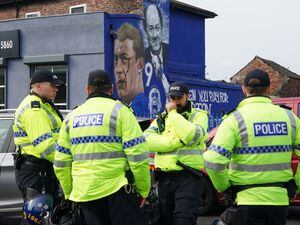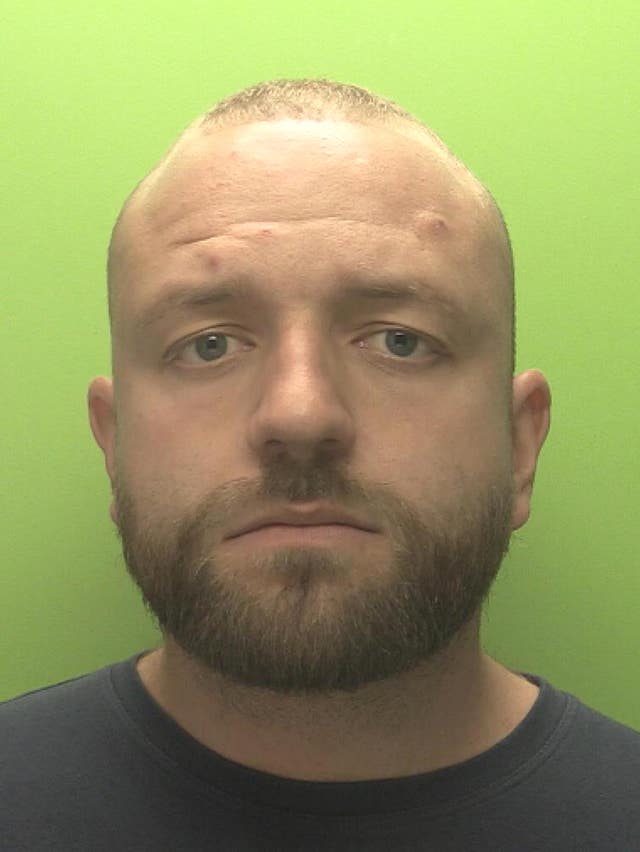Football arrests reach eight-year high in ‘extremely worrying’ new figures
Last season was marred by a series of incidents where players were assaulted by pitch-invading fans.

Football arrests reached their highest level for eight years last season while pitch invasions more than doubled compared to pre-pandemic levels, new data from the Home Office shows.
The 2021-22 statistics for matches played in England and Wales make grim reading for the football authorities and law enforcement agencies, and follow a campaign which was marred by players being assaulted by pitch-invading fans.
A custodial sentence was imposed on a Leicester fan who assaulted three Nottingham Forest players during an FA Cup match in February, while a Forest fan was given a 24-week jail term and a 10-year banning order for headbutting Sheffield United player Billy Sharp during a Championship play-off match in May.

The 2,198 football-related arrests recorded last season was the highest figure since 2013-14, while the number of matches where hate crime incidents were reported was up 99 per cent on 2018-19, to 384. Reported incidents of disorder of some kind were recorded at 1,609 matches, equivalent to 53 per cent of the 3,019 regulated games covered by the data.
The number of matches where possession of pyrotechnics was recorded was 729, a 118 per cent increase.
Chief Constable Mark Roberts, the National Police Chiefs’ Council lead for football policing, described the statistics as “extremely worrying” but welcomed the announcement from the Premier League on Wednesday on minimum one-year bans for any supporter who invades the pitch or is caught carrying or setting off pyrotechnics.

He told PA: “Once there are several hundred people on the pitch it’s impossible to separate those people who just want to enjoy themselves from those who want to assault players, threaten players and aggravate the opposition fans, and then it gets difficult to manage.
“So there needs to be some collective responsibility here. I think for a number of seasons there’s been a degree of tolerance with end-of-season pitch invasions.
“Unfortunately, what we’ve seen is players are being assaulted. So there’s going to have to be a firm line drawn, because what we’ve done before isn’t working.
“There needs to be an understanding that you can’t go on the pitch and there will be a sanction for it.”
“When we do operations on the rail network and when we do operations at grounds, we are consistently finding the presence of cocaine,” he said.
“When we’ve done exercises where we’ve swabbed in toilets in grounds, we know they’re clear before the game, then when we swab afterwards, you’re generally getting a 100 per cent hit rate (for cocaine).
“So clearly it’s a prevalent thing to take at football and we need to clamp down on that. There is ample evidence that cocaine, particularly with alcohol, in a heightened state of emotion which you often get with football, leads to aggressive and violent behaviour.”
Football banning orders have now been extended to cover convictions for online hate crime linked to the sport, while convictions for selling or taking Class A drugs will also come under the banning order regime from October.
Douglas Mackay, the Deputy Chief Crown Prosecutor for the West Midlands and the Crown Prosecution Service’s sports lead prosecutor, said the Police, Crime, Sentencing and Courts Act 2022 this summer would also have an impact on the imposition of banning orders in the future.
He told PA: “Before the end of June, a court had to be satisfied that a banning order would prevent violence or disorder. So there was, in effect, a test for the prosecution and police to overcome.
“The test post-29th of June is that the courts will impose a banning order unless it’s unjust in all the circumstances to do so. So the emphasis is slightly more on the defendant to show why it’s unjust to impose it, and I think it’s reasonable to expect a rise in banning orders as a result of that change.”





